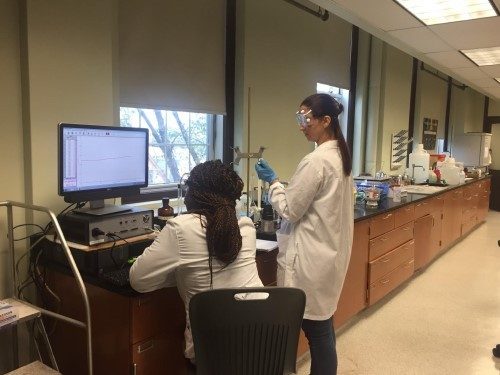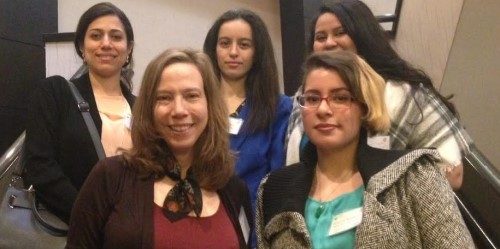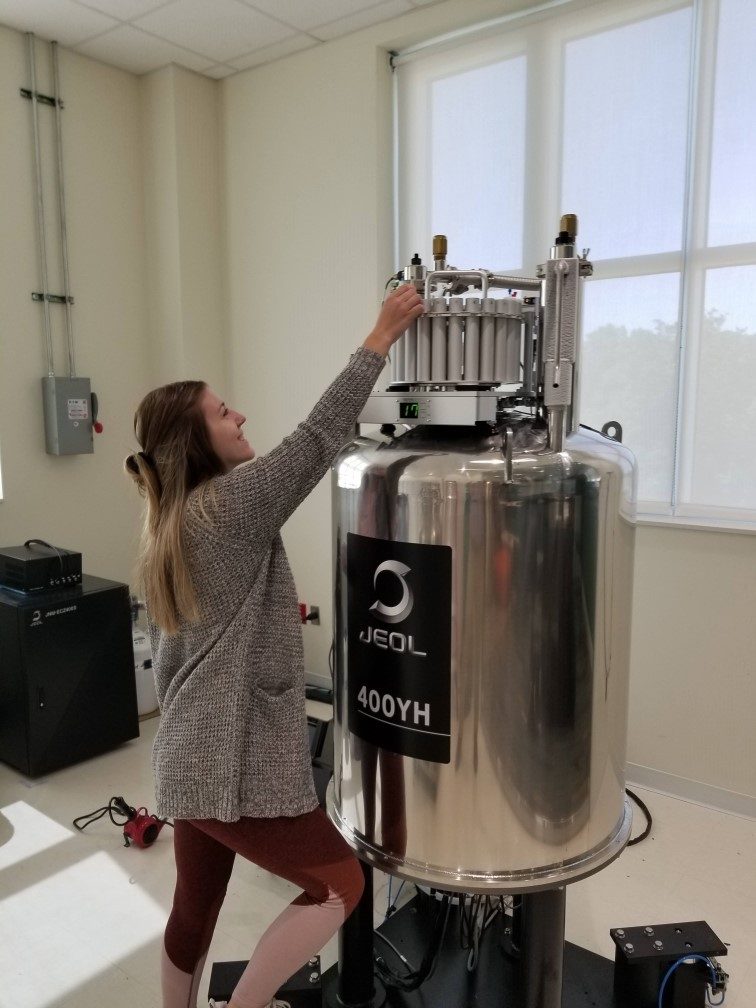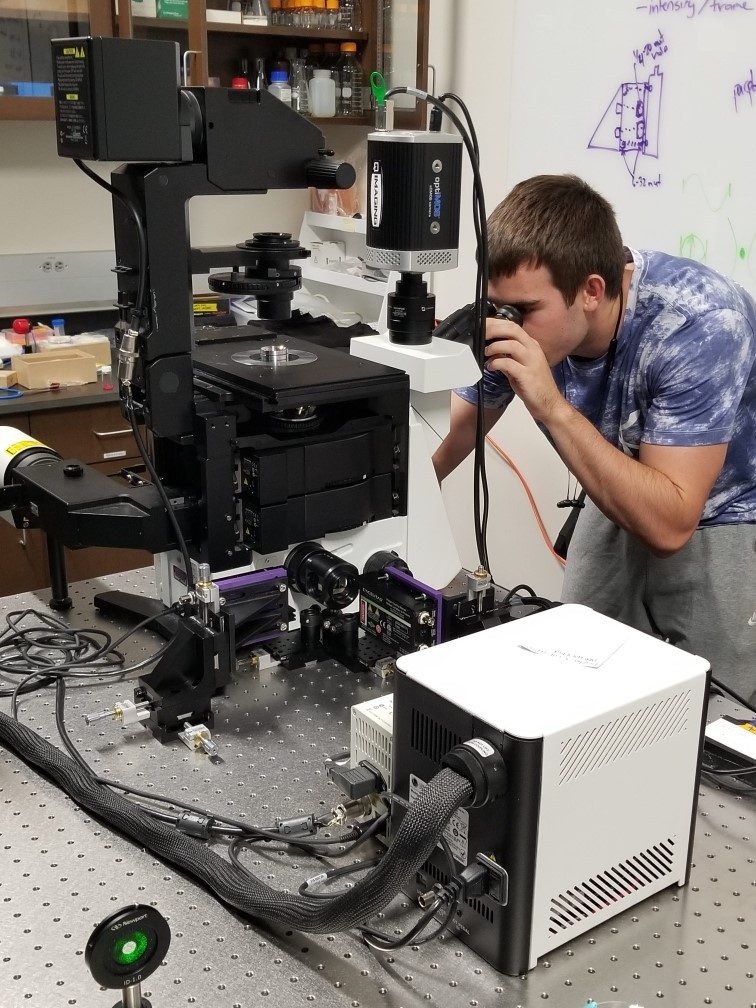Institutional Highlights
Two New Kids on the ACS Block
by Mike May for the American Chemical Society
In August 2021, the American Chemical Society granted approval to five new chemistry programs. We sat down with two of the recently approved programs at Saint Peters University and High Point University to learn how approval status builds on rich histories at both institutions
In 1872, Saint Peters College was founded in Jersey City, New Jersey. This Jesuit College grew into Saint Peters University, which is located about a mile west of the Holland Tunnel into Manhattan. As part of its celebration of 150 years since its founding, the chemistry department received ACS-approval.
When asked to describe the Saint Peters University chemistry department, Jessica Epstein, Ph.D.—professor and chemistry department chair—says, “We’re a small college, but our department is growing.”
Even as a liberal arts college, research stands out among the opportunities for chemistry students at Saint Peters. “The undergraduates have the opportunity to work with a faculty member to do undergraduate research, and many of them are co-authors on peer-reviewed papers,” Epstein says. “That’s something we’re really proud about in our department, and we encourage junior faculty to participate.” As she adds, “It’s the personality our department sort of evolved into.”
To keep evolving, Epstein and her colleagues wanted to see how they stacked up to other chemistry departments. “We wanted to make sure that our curriculum and our program were up to the ACS standards,” she says. “We also wanted to get more credibility for our majors.”
In addition, Epstein and her colleagues hope that the ACS stamp of approval will fuel other endeavors. “We apply for a lot of grants,” Epstein explains, “and we thought that ACS approval would be really helpful in the grants.” Many of these are science, technology, engineering, and math (STEM) grants that focus on teaching. For such grant applications, Epstein hopes that the ACS approval will make Saint Peters “stand out a little bit more,” as she puts it.
With such a focus on teaching, Epstein and her colleagues anticipate that ACS approval will enhance the on-campus and off-campus experience of the students. As an example, Epstein says, “I think it will help students get more involved in ACS, which can be a wonderful experience.” Some of the research students even go to local ACS meetings. “We’re trying to help them see that there’s a larger chemistry community and get them more involved.” Epstein explains. “The approval process is just one piece of that.”
In some ways, the larger chemistry community that Epstein mentioned starts right in the department. The faculty members at Saint Peters work on a variety of chemistry projects. As an example, Epstein mentions Yosra Badiei, Ph.D., a faculty member “who works on alternative ways to generate hydrogen fuel—working with metal catalysts to mimic plants.” She also points out ongoing work in search of bacteria-resistant materials that might be incorporated in implantable medical devices, such as pacemakers or stents.
Additionally, many of Epstein’s colleagues conduct research on the best ways to teach chemistry. As she says, members of the faculty “do a fair amount of education research.” She calls that “a wonderful thing for students because they’re piloting new teaching tools for the classroom.”
That’s not the only new exploration that Epstein and her colleagues face. Like the rest of the world, this chemistry department is learning how to perform in a pandemic. That even impacted this university’s ACS-approval process. Part of that includes a university tour, which could not be done in person in the face of COVID-19. “So, we did a video tour,” Epstein says, “and the reviewers were really encouraging.” She adds, “In the whole process, I felt like they wanted us to succeed; if we didn’t succeed, they would tell us exactly what we need to do to succeed—either way you were going to win.”
Teamwork in the Triad
High Point University lies in the Piedmont Triad region of North Carolina—a north-central area anchored by Greensboro, Winston-Salem, and High Point. Founded in 1924 as High Point College in a town known as the center of the southern furniture industry, this university knows how to build new capabilities.
“We’ve got a really dynamic, young department—most of the faculty were hired in the last decade or so,” says Brian Augustine, Ph.D., professor and chair of the chemistry department. “We have a very research-active faculty that covers all the major areas of chemistry.”
Plus, the faculty and students work in a new building that was opened in 2019. “It’s a great teaching and research space,” Augustine says. “We’re primarily an undergraduate institution, and much of our focus is on teaching, but we have a very active undergraduate research program as well.”
Current students appreciate the research opportunities and the new ACS approval. For example, Rachel Day—a sophomore chemistry major from Fargo, North Dakota who is focusing on a future of chemical research in industry—says, “Having an ACS-certified degree ensures that I am doing coursework that will prepare me for a future as a research chemist.” She adds, “It will also help strengthen my graduate school applications since my degree meets the high standards of the ACS.”
It’s all about working together, according to junior chemistry major Andrew Lawrence from Columbus, Ohio. “The High Point chemistry department is a close-knit family that wants to see everyone succeed, and the ACS approval is another step that our faculty has taken for us to advance further into the professions we want by obtaining a degree with even more significance in a scientific world.” One day, Lawrence hopes to work in research at the U.S. Drug Enforcement Agency. He hopes that an ACS-approved degree will help him reach that goal. As he adds: “By being able to graduate from a school with an ACS approval, I know that my school is meeting the high standards of a demanding world where science is constantly growing and evolving.”
Augustine and his colleagues also see the benefits of working together. “About eight years ago, we had very little in terms of modern instrumentation”. “We had some older instruments, but not very much state-of-the-art research instrumentation.” With the opening of the new chemistry building, the department partnered with Shimadzu Scientific Instruments through its Shimadzu Partnership for Academics, Research and Quality of Life (SPARQ) program. This produced what Augustine calls “a big influx of instrumentation.” With SPARQ and a U.S. National Science Foundation grant for major instrumentation, Augustine says, “we’ve got a broad cross section of all the cool toys that chemists use, including high-field NMR and other advanced platforms.”
Those devices helps students from the beginning. “Chemistry majors start using that equipment in their freshman year,” Augustine explains. “By the time they are seniors, they will be very well trained on GC, mass spec, LC-mass spec, NMR, atomic-force microscopy, HPLC—all kinds of instrumentation.” He adds. “A really important part of our program is exposing students to cutting-edge instrumentation.”
Those opportunities at High Point extend beyond the academic year. In the university’s Summer Research Program in the Science, SuRPS, students can delve even deeper into using the advanced instruments. “There’s a big, big group of students and a big group of faculty who were very active in the summertime,” Augustine says. “Then, we have a high priority for them to go out and present their work at regional and national meetings, including the national ACS meeting.” So, year-round teamwork drives learning at High Point.
"I think [ACS Approval] will help students get more involved in ACS, which can be a wonderful experience...We’re trying to help [students] see that there’s a larger chemistry community and get them more involved...The approval process is just one piece of that.”- Jessica Epstein, Ph.D., Department Chair, St. Peter's University





